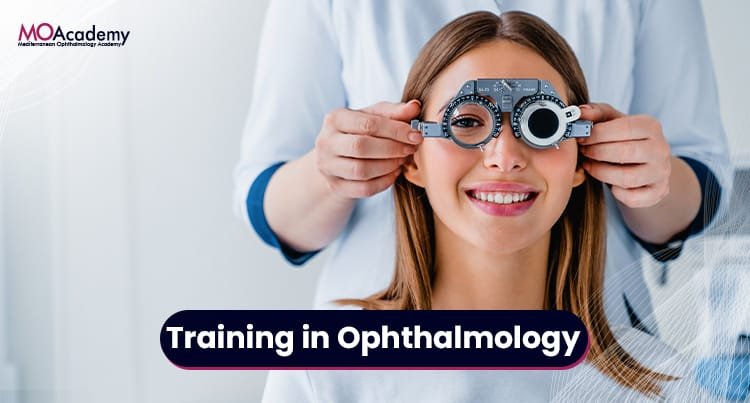Advancing Eye Care: Comprehensive Training in Ophthalmology
]Comprehensive Training in Ophthalmology
For all the aspiring Ophthalmologists, prepare all your queries regarding the training
in Ophthalmology as it is about to get answered.
The training in Ophthalmology is a designed curriculum that is structured for ophthalmology
professionals to get the needed knowledge and hands-on experience
that will add the needed proficiency to their diagnosis methods and treatment
of the different eye disorders.
The optimal manner to breakdown the training in Ophthalmology is to know
what are the types of this medical training as well as what qualities that are indispensable
to be in a training in Ophthalmology.
Therefore, Mo Academy will be focusing on the formerly mentioned two points throughout the coming lines.
Before we keep on, it is a great start to have a close look at ophthalmology courses uk,
Ophthalmology Training, Ophthalmology Technician Training,
and Ophthalmology Specialty Training.
What Are the Types of Training in Ophthalmology?
Training in Ophthalmology is divided into multiple types, and each one focuses
on assisting ophthalmologists to acquire certain types of knowledge theoretically and in the clinical field.
Pre-specialization training, also known as Medical Training:
This training in Ophthalmology focuses on laying the basic steps into the medical field.
In this training, ophthalmologists get introduced to the general knowledge in the medical field,
including anatomy, physiology, pathology, pharmacology, and clinical skills.
Additionally, they get introduced to different common eye conditions
and the most up to date examination methodologies.
Ophthalmology Residency:
This training is of a deeper nature as it prepares ophthalmologists for independent practices.
It usually lasts from 3 to 4 years.
The Ophthalmology residency includes surgical training that covers hands-on practice
to performing the most common ophthalmic surgeries; for example,
cataract removal, LASIK, and curing eye infections.
The Ophthalmology residency also includes didactic training,
which ensures that ophthalmologists attend lectures, seminars,
and workshops that provide them with the needed knowledge and clinical experience.
It enhances the ophthalmologist’s diagnostic methods.
To ensure that ophthalmologists cover as many topics as possible,
this training gives its residents the opportunity to do clinical rotations,
in which they get to train on different Ophthalmology subspecialties such as retina,
phacoemulsification, corneal diseases, and Pediatric Ophthalmology.
Lastly, this training in Ophthalmology includes part for patient care.
This means that it trains its residents on keeping track of patients’ history and creating treatment plans.
Ophthalmology Fellowships (Subspecialty Training):
This type of Ophthalmology training focuses on specific areas of Ophthalmology.
While it lasts from1 to 2 years, this training allows fellows to receive advanced
training in a precise subspecialty.
There are multiple types of the Ophthalmology fellowship such as the retina fellowship.
This one focuses on retina related diseases such as diabetic retinopathy and retinal surgery.
Additionally, it covers other specialities such as Glaucoma, which covers the most advanced
methods of managing Glaucoma and its surgical treatments,
in addition to many other Ophthalmology specialities.
Mo Academy covers for you everything you need to know about retina and vitreous surgery,
surgical retina fellowship, vitreoretinal surgery procedure,
vitreous retinal surgery, Medical Retina Training, and Medical Retina Online Course.
How to Make Sure that a Training in Ophthalmology Is the Perfect One?
Accreditation of the Program:
Ophthalmologists need to ensure that the training they are enrolling is accredited
by reliable education boards; for instance, the Accreditation Council for Graduate
Medical Education, which is also known as ACGME.
Additionally, ophthalmologists need to keep track of the trainings’ success record and reputation.
The Spectrum of the Clinical Exposure:
Ophthalmologists need to make sure that their training in Ophthalmolog is wide in the areas
of training it covers.
It has to have all the needed resources in order to acquire theoretical knowledge
from the different international resources.
Additionally, the training must include hands-on training.
By hands-on experience, it is meant to include the examination, diagnosis,
treatment planning, and performing surgeries in real life.
Faculty and Mentorship:
Ophthalmologists need to look for faculties that have leaders within the medical field.
Be eager to find faculties with surgeons who are looked up to in their field.
Additionally, within the practical training, you need to enroll in a training that provides
the needed mentorship in order to receive the needed guidance.
Additionally, the faculty itself should be providing the needed career and medical guidance.
The well known faculties in the medical field ensure that their residents have all the needed
research and knowledge resources in order to make sure that its residents will acquire
the correct and reliable knowledge from the most effective resources and in the easiest way.
Conclusion:
Ophthalmologists need to enroll in different training courses in order to become certified
and ready to operate independently; therefore, Mo Academy is explaining
the different types of training in Ophthalmology.
This includes the medical training that lays the basis of the Ophthalmology field
and the anatomy of the eyes.
When done, many Ophthalmologists direct their coming footsteps to the Ophthalmology
residency in order to get deeper knowledge and in more variant aspects, meaning practical,
theoretical knowledge and patient care.
Moreover:
Following this, it is usually the right timing to enroll in a fellowship that will direct them even
further into the specialty they are willing to pursue, whether pediatric eye care, cataract, or retina.
In order for Ophthalmologists to ensure that their training
has all the looked for qualities, it must have the needed certified
accreditation accompanied with the proper reputation.
Additionally, the training needs to provide the needed theoretical
and practical exposure for its fellows.
Lastly, it is much needed to choose faculty that is known for its
mentorship and top surgeons in the medical field.
If you still have inquiries related to any type of training in Ophthalmology,
Mo Academy’s team is professional and is there for you to Contact us
and get all your questions answered.

